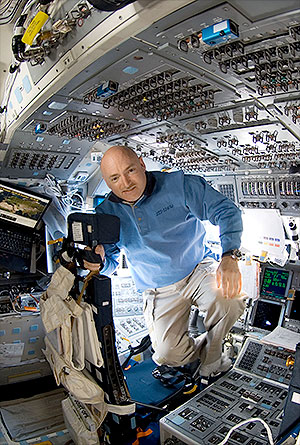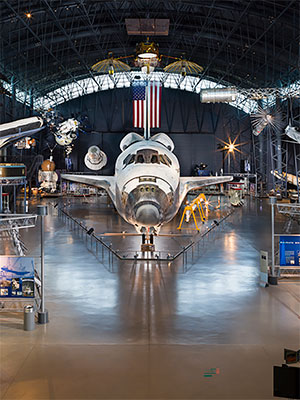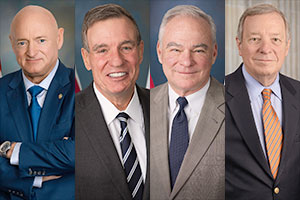September 29, 2025 — A former NASA astronaut-turned-U.S. Senator has joined with other lawmakers to insist that his twice ride to space remain grounded and on display in the Smithsonian.
Mark Kelly, who today represents the state of Arizona, has joined with fellow Democrat Senators Mark Warner and Tim Kaine, both of Virginia, and Dick Durbin of Illinois to try to halt the move of space shuttle Discovery to Houston, as enacted into law earlier this year. Kelly flew two of his four missions aboard Discovery.
"Why should hundreds of millions of taxpayer dollars be spent just to jeopardize a piece of American history that's already protected and on display?" wrote Kelly in a social media post on Friday (26). "Space Shuttle Discovery belongs at the Smithsonian where millions of people, including students and veterans, go to see it for free."
In a letter sent on the same day to the leadership of the Senate Committee on Appropriations, Kelly and his three colleagues cautioned that any effort to transfer the winged orbiter would "waste taxpayer dollars, risk permanent damage to the shuttle and mean fewer visitors would be able to visit it."
"It is worth noting that there is little evidence of broad public demand for such a move," wrote Kelly, Warner, Kaine and Durbin.
'Inefficient and unjustifiable'
In the letter, the senators asked that committee chair Susan Collins (R-ME) and vice chair Patty Murray (D-WA) block funding for Discovery's relocation in both the Fiscal Year 2026 Interior-Environment appropriations bill and FY26 Commerce, Justice, Science appropriations bill.
The letter is the latest response to a campaign begun by Senators John Cornyn and Ted Cruz, both Republicans from Texas, to remove Discovery from its 13-year home at the National Air and Space Museum's Steven F. Udvar-Hazy Center in Chantilly, Virginia and put it on display at Space Center Houston, the visitor center for NASA's Johnson Space Center in Texas. Cornyn and Cruz claim that the decision to place Discovery at the Smithsonian was a snub to Houston, which is home of the astronauts, Mission Control and the primary training site for NASA's space shuttle program.
"Houston's disappointment in not being selected is wholly understandable," the four senators wrote, "but removing an item from the National Collection is not a viable solution."
In July, Cornyn and Cruz were successful in adding language to the "One Big Beautiful Bill Act" championed by President Donald Trump, which enabled acting NASA Administrator Sean Duffy to then identify Discovery for relocation. The provision also called for $85 million to be made available to transport and display the shuttle in Houston.
"There are also profound financial challenges associated with this transfer," wrote Kelly. Warner, Kaine and Durbin. "The Smithsonian estimates that transporting Discovery from Virginia to Houston could cost more than $50 million, with another $325 million needed for planning, exhibit reconstruction, and new facilities."
"Dedicating hundreds of millions of taxpayer dollars to move an artifact that is already housed, displayed and preserved in a world-class facility is both inefficient and unjustifiable," the senators wrote.
Risks and rewards
Then there are the logistical challenges with relocating Discovery, which could result in damaging it, "permanently diminishing its historical and cultural value for future generations."
"Moving Discovery by barge or road would be far more complex [than previous shuttle moves], exposing it to saltwater, weather and collision risks across a journey several times longer," the letter reads. "As a one-of-a-kind artifact that has already endured the stresses of spaceflight, Discovery is uniquely vulnerable to these hazards. The heat tiles that enabled repeated shuttle missions become more fragile with age, and they are irreplaceable."
Kelly, who previously lived in Houston when he was part of the space program, agrees that the city is central to NASA's human spaceflight efforts, but, along with Warner, Kaine and Durbin, points out that displaying Discovery would come with another cost: an admission fee, limiting public access to the shuttle.
"The Smithsonian is unique among museums for providing visitors with access to a national treasure meant to inspire the American public without placing economic barriers," wrote the senators.
Under the terms of the act, NASA has until Jan. 4, 2027 (18 months of the bill's enactment) to transfer Discovery to Space Center Houston. For its part, the Smithsonian says that it owns title to Discovery and, as the institution is not a part of the federal government, the orbiter is no longer the government's to move. |
|

Before becoming a U.S. Senator, NASA astronaut Mark Kelly was the commander of the space shuttle Discovery, as seen on the flight deck during the STS-124 mission in June 2008. (NASA)

Space shuttle Discovery on display inside the James S. McDonnell Space Hangar at the National Air and Space Museum's Steven F. Udvar-Hazy Center in Chantilly, Virginia. (Smithsonian)

Senators Mark Kelly of Arizona, Mark Warner and Tim Kaine, both of Virginia, and Dick Durbin of Illinois joined together to protest the move of space shuttle Discovery. (U.S. Senate) |
